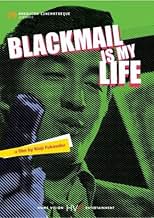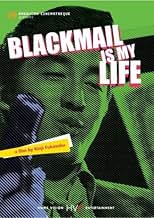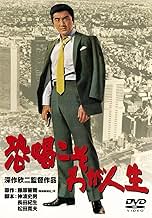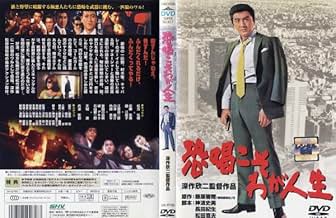अपनी भाषा में प्लॉट जोड़ेंA pungent, extremely entertaining tale of hedonistic, amoral blackmailer Matsukata.A pungent, extremely entertaining tale of hedonistic, amoral blackmailer Matsukata.A pungent, extremely entertaining tale of hedonistic, amoral blackmailer Matsukata.
फ़ीचर्ड समीक्षाएं
The main character, Shun, characterized as a 'young punk' with his group of youthful, attractive social outcast friends, finds money in the business of blackmail in the underworld of an economically vibrant Japan. While riding high off a string of successful extortions of small time yakuza affiliates, their ill fated plot to steal a sensitive memorandum proves they have bitten off more than they can chew. I was initially impressed with the movie's style and pace and it seemed to be setting up a fun movie surrounding the exploits of this group of young bright eyed kids. I enjoyed how each character was given scenes that showcase them while Shun is still given the most back-story. That is all done in a pretty successfully stylized manner. But the main plot fails to really stimulate after the first 45 minutes of setup. I think the problem was that stealing a memorandum for money just wasn't as exciting as events that happened earlier in the movie and Fukasaku gets little heavy handed communicating themes in this later part of the movie, causing a few eye rolls on my part. A well shot movie- perhaps not the most realistic premise, and enjoyable, but not super thrilling.
Blackmail Is My Life (1968)
Well, the bad guys (four men and one woman, all young and good looking) have a lot of fun, and carry a lot of poise. As rank amateurs they are lucky and, between racing around in their car, show a lot of cool style. It's 1968 in Japan, and it feels like maybe 1964 in the U.S., with people still wearing suits and looking good doing it.
Eventually, they get in over their heads, but we don't really worry at first. They often say vague things like, "We'll go ahead with out plan," but they never say what they are planning. And then the plan happens, and it's fast and jazzy, in a kind of extended television way. The plot is kind of interesting, digging into the underworld of Japan in this sideways fashion. And visually it's fun, very nice wide screen compositions in a wide range of gritty Japanese locations. There is even a dramatic, spare electric guitar score, perfect for the period.
The more serious and deadly this movie gets, the more it loses it's lighthearted flaws. There is clearly (to me) an influence from Bonnie and Clyde (the previous year) with romanticizing bad guys and extended violence. There is some real poignancy built in, as well. There are lots of night scenes and dramatic lighting, and this has a late film noir kind of quality, somehow, dark and brooding between action scenes. If you don't mind some Japanese camp aspects, this might really make your night. And just a heads up: the second half is easier to like in a conventional way, even if the first half is more original and excessive.
Well, the bad guys (four men and one woman, all young and good looking) have a lot of fun, and carry a lot of poise. As rank amateurs they are lucky and, between racing around in their car, show a lot of cool style. It's 1968 in Japan, and it feels like maybe 1964 in the U.S., with people still wearing suits and looking good doing it.
Eventually, they get in over their heads, but we don't really worry at first. They often say vague things like, "We'll go ahead with out plan," but they never say what they are planning. And then the plan happens, and it's fast and jazzy, in a kind of extended television way. The plot is kind of interesting, digging into the underworld of Japan in this sideways fashion. And visually it's fun, very nice wide screen compositions in a wide range of gritty Japanese locations. There is even a dramatic, spare electric guitar score, perfect for the period.
The more serious and deadly this movie gets, the more it loses it's lighthearted flaws. There is clearly (to me) an influence from Bonnie and Clyde (the previous year) with romanticizing bad guys and extended violence. There is some real poignancy built in, as well. There are lots of night scenes and dramatic lighting, and this has a late film noir kind of quality, somehow, dark and brooding between action scenes. If you don't mind some Japanese camp aspects, this might really make your night. And just a heads up: the second half is easier to like in a conventional way, even if the first half is more original and excessive.
The story involves four people whose work is blackmail. They're successful in their "business," but their eyes eventually get too big for their stomachs when they think they've found a way to rip off the yakuza. The job proves harder than the easy money it initially seemed. While it is generally well done, its techniques reminded me a little too much of the annoying modern style with a lot of unnecessary freeze frames, chronological jumps, and shifts from black and white to color. I also felt that the characters ought to have been more well developed; the story is good, but the style overwhelms possible substance. My favorite part of the film is the fact that the characters whistle the theme tune to Suzuki Seijun's Tokyo Drifter, which means that Suzuki had to have had some popularity if his work was quoted like this. 7/10.
Blackmail is my Life came in a transitional period for Japanese crime cinema and it shows that by being somehow stylistically confused. The genre was with one foot still set on the earlier Nikkatsu pictures that portrayed yakuzas as people who operated with some sense of chivalry (and BIML reflects that by having the blackmailers act as the heroes), the cool of Seijun Suzuki who bid the genre adieu with Branded to Kill one year earlier (and what an adieu that was) and one foot looking at the future.
The first half of the picture resembles the colourful pop air of Suzuki and anticipates the disjointed timelines and narrative style of The Yakuza Papers. Hiroki Matsukata is Muraki; professional blackmailer and quite successful at that. He lies on a bed and remembers. Flashbacks show us his humble beginnings. They start in black and white then colour kicks in. Frames freeze while he narrates in a voice-over. We go back and forth like that until after the half hour mark the story starts to shape up. His rise as a prominent blackmailer is seen through a series of incidents that lead up to the big con.
The second half is predicated more on character than style. Fukasaku puts the quirky flashbacks, stills and narration of the beginning to the side and focuses on the story in a straight-forward manner. He's just as good this way. The movie turns more cynical and gritty and the ending is particularly memorable.
The director is still not at the top of his craft (it's relatively still early in his career) but he shows that he's not willing to settle down for a simple, run-of-the-mill yakuza flick. He gambles; sometimes he wins, sometimes he doesn't. But he dares and as the saying goes, fortune favours the brave. If he hadn't taken a stab at a different approach like BIML, maybe The Yakuza Papers would have never materialized in all its glory. In that sense, Fukasaku deserves kudos for taking chances and following his vision.
Blackmail is my Life may not always be successful in its stylistic daring but it's entertaining and cool. As the missing link between the hard bop of the 60's and the grittiness of the 70's, it's an important part of the general picture. Fans owe it to themselves to check it out.
The first half of the picture resembles the colourful pop air of Suzuki and anticipates the disjointed timelines and narrative style of The Yakuza Papers. Hiroki Matsukata is Muraki; professional blackmailer and quite successful at that. He lies on a bed and remembers. Flashbacks show us his humble beginnings. They start in black and white then colour kicks in. Frames freeze while he narrates in a voice-over. We go back and forth like that until after the half hour mark the story starts to shape up. His rise as a prominent blackmailer is seen through a series of incidents that lead up to the big con.
The second half is predicated more on character than style. Fukasaku puts the quirky flashbacks, stills and narration of the beginning to the side and focuses on the story in a straight-forward manner. He's just as good this way. The movie turns more cynical and gritty and the ending is particularly memorable.
The director is still not at the top of his craft (it's relatively still early in his career) but he shows that he's not willing to settle down for a simple, run-of-the-mill yakuza flick. He gambles; sometimes he wins, sometimes he doesn't. But he dares and as the saying goes, fortune favours the brave. If he hadn't taken a stab at a different approach like BIML, maybe The Yakuza Papers would have never materialized in all its glory. In that sense, Fukasaku deserves kudos for taking chances and following his vision.
Blackmail is my Life may not always be successful in its stylistic daring but it's entertaining and cool. As the missing link between the hard bop of the 60's and the grittiness of the 70's, it's an important part of the general picture. Fans owe it to themselves to check it out.
Very stylish and innovative, this also moves at a furious pace. Excitingly and beautifully shot, this is a tale of four youngsters setting out on a career as blackmailers as they seem to have been passed by in the post-war Japanese boom. It can be a bit confusing with so many characters and the usual, bluff, double bluff and downright betrayal. The story is told both backwards and forwards and often the only way to tell of a flashback is that it begins in b/w, slowly turning to colour for most of the sequence, except for the times that it doesn't! There are so many stand out sequences but a colour sequence of consensual lovemaking intercut with one that is certainly not consensual in b/w is particularly effective. Outstanding camera-work and direction ensure that this looks and feels great all the time and if the ending is a little melodramatic, it is still enthusiastically shot with hand held and whirling cameras.
क्या आपको पता है
- ट्रिवियाTitle music, played several times during the film, is ripped off (different but substantially an imitation) from the 1966 Yardbirds' song "Over Under Sideways Down".
- कनेक्शनReferences Tôkyô nagaremono (1966)
टॉप पसंद
रेटिंग देने के लिए साइन-इन करें और वैयक्तिकृत सुझावों के लिए वॉचलिस्ट करें
विवरण
- कंट्री ऑफ़ ओरिजिन
- भाषा
- इस रूप में भी जाना जाता है
- Blackmail Is My Life
- उत्पादन कंपनी
- IMDbPro पर और कंपनी क्रेडिट देखें
- चलने की अवधि1 घंटा 30 मिनट
- ध्वनि मिश्रण
- पक्ष अनुपात
- 2.35 : 1
इस पेज में योगदान दें
किसी बदलाव का सुझाव दें या अनुपलब्ध कॉन्टेंट जोड़ें

टॉप गैप
By what name was Kyôkatsu koso waga jinsei (1968) officially released in Canada in English?
जवाब





















